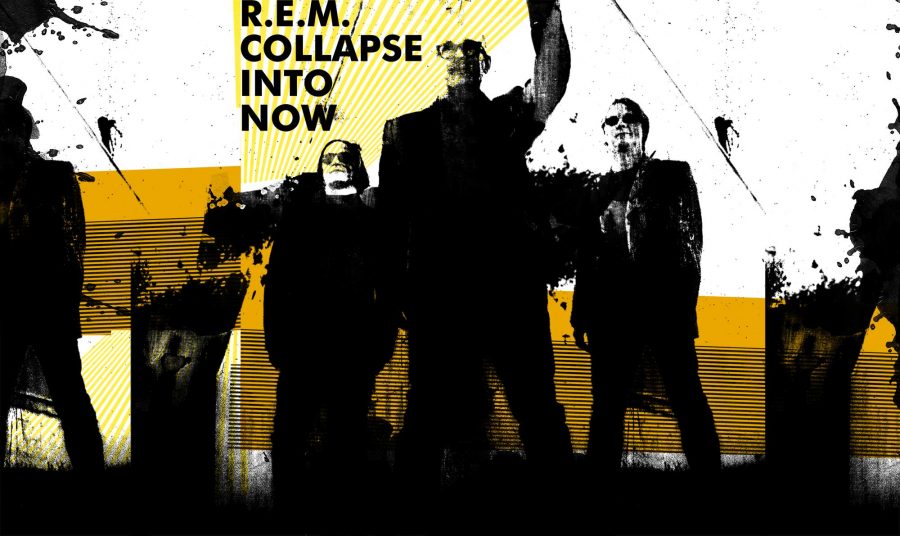And so, it came to pass that, 30 years after their debut single ‘Radio Free Europe’ R.E.M. released their 15th and final album in 2011. When, a few months after the album’s release, the band announced their split, it truly was the end of an era. A few people sneered that they hadn’t made a decent album in years, and many still annoyed that Bill Berry had left (well over a decade previously by this point) even though this was the fifth album as a trio. Listening to Collapse Into Now does make you wonder: ‘had they not listened to the la(te)st album?’
… But we’re getting ahead of ourselves.
It might be tempting to try and completely disassociate the final album from the split, but it’s not really necessary, because the story of the band coming to an end is part of the album. In an interview with avclub.com a few months after its release, bassist Mike Mills acknowledged that there had been discussions for some time about breaking up. ‘’We knew we had some decisions to make regarding our contract with Warner Bros. We had to make some decision about how to continue going forward as a recording unit, and if we still wanted to tour together. Oddly enough, I think that independently, we all arrived at the conclusion that this was such a great opportunity to walk away on our own terms, that we thought, “Why not take advantage of it?”
There’s a few, but not many bands that make it to 15 albums. Sure the Stones and The Fall did, but usually, if drink and drugs haven’t taken their toll, then relationships have got almost irreversibly fractured. Not so for R.E.M. Mills pondered in the same interview: ‘Who would expect a band to walk away when they’re hitting creative heights? But that’s just what we decided to do.’
The album opens with ‘Discoverer’ that feels like it’s the missing link between both ‘Finest Worksong’ and ‘What’s The Frequency, Kenneth?,’ all of them fine examples of the band as a ROCK band, and indeed, all openers. It feels like a statement of intent: we are still R.E.M. Though the band didn’t tour the album, it’s easy to imagine this track opening gigs. Singer Michael Stipe said of the song: “It’s a song of discovery. It’s about realizing that the city offers you this unbelievable potential and opportunity; all the things you are looking for in your teens and your twenties. That’s what New York offered me.
It leads into ‘All the best,’ with its chorus of “I think I’ll sing it and rhyme/I’ll give it one more time.” It’s easy with hindsight to see they were signing off now), a fairly short rocker, that clocks in at less than three minutes.
The band’s aim had been to walk away on their own terms, and that’s exactly what they did. While fans may argue about what exactly constitutes R.E.M.’s high point (Hell, we’ve been doing it here all week at GIITTV), Collapse Into Now deserves to be given another chance by many supposed fans. This was not a band fading out with barely a whimper, but a band going out on their own terms. If this week has prompted you to reinvestigate R.E.M. again – or even for the first time – this album is just as much part of the story as anything from the band’s 30 years. Sure, some wise guy might make cracks about it being in their top 15 R.E.M. albums but this record deserves to be played again. Possibly the most underrated album in their catalogue, if you haven’t played this before or only ever listened to it a couple of times, now is the time to listen with fresh ears.
The pace slows down for ‘Uberlein’ and ‘Oh My Heart’ which sees Peter Buck bring out his mandolin again. Both of these are ballads as beautiful as they ever recorded, and it is not stretching it too much to imagine then fit perfectly on Out Of Time, 20 years previously. By this point, the listener is being reminded just how excellent a band R.E.M. are -or have been – and that regardless of it being the final album, they had succeeded in musically being on top of their game.
The first part of the record also features Eddie Vedder of Pearl Jam on the country-tinged ‘It Happened Today’ and finishes with the gentle arpeggios of ‘Every Day Is Yours To Win.’ Just as Joy Division seemed to be passing on the torch with ‘Decades’ – ‘here are the young men, the wait on their shoulders‘ – so here R.E.M. do the same. If they had toured this album, it is easy to imagine this pair of songs lighting up the audience along older tracks.
The second part of the record sees the return of the Peter Buck jangle, on ‘Mine Smell Like Honey’ which evokes the 1980s R.E.M. mixed in with gorgeous harmonies. This serves as a counterpoint to the reflective, piano-led ‘Walk It Back.’ Very much an album track, it sounds almost like a hymn and is evocative of much of their ’90s work. A reminder that R.E.M could do ‘lighters in the air’ ballads without descending into platitudes and cliche. While it may initially seem slight, repeated listens reveal this to be a very affecting listen, and one of many reflective points on the album.
This is thrown by the placing of two rockers, both very different in their approach. Peaches contributes backing vocals to the bizarrely titled ‘Alligator_Aviator_Autopilot_Antimatter‘ which seems to want to prove early commentators right about their music being a bunch of nonsense over some minor chords – and it’s absolutely brilliant for it. In contrast ‘That Someone Is You’ is a short two-minute thrash, which gets to absolutely no discernible point very quickly.
It’s never entirely clear what the relationship is between Stipe, or indeed Berry or Mills and the legendary actor is on ‘Me, Marlon Brando, Marlon Brando and I‘ but the mood is wistful, one final outing for the Buck mandolin. In much sharper contrast, the album’s closer ‘Blue’ is unquestionably the most experimental track. It features vocals from Patti Smith, who had previously contributed vocals to ‘E-Bow The Letter’ which form a counterpoint to Stipe’s spoken word. It’s the track that contributes the album’s title, which Smith herself suggested after reading Stipe’s lyrics. While it could have been a ballad or an uptempo number, it’s the band, gently, reminding the listeners that they could do these things on their own terms. As a final clever aside it briefly reprises ‘Discoverer‘ before gently fading away.
On the album’s release, the reviews were, on the whole positive. The Guardian called it their best album in years, while The Independent commented that it was “a welcome return to a more varied textural palette.” Rolling Stone commented perceptively that “to Now, they sound like they’d rather be a band than a legend, which must be why they keep pushing on” and that the band should be proud. Later on, the band seemed amused that people hadn’t picked up on the clues within the record, starting with the fact it was the first time the band had appeared on the front cover of any of their albums.
The band’s aim had been to walk away on their own terms, and that’s exactly what they did. While fans may argue about what exactly constitutes R.E.M.’s high point (Hell, we’ve been doing it here all week at GIITTV), Collapse Into Now deserves to be given another chance by many supposed fans. This was not a band fading out with barely a whimper, but a band going out on their own terms. If this week has prompted you to reinvestigate R.E.M. again – or even for the first time – this album is just as much part of the story as anything from the band’s 30 years. Sure, some wise guy might make cracks about it being in their top 15 R.E.M. albums but this record deserves to be played again. Possibly the most underrated album in their catalogue, if you haven’t played this before or only ever listened to it a couple of times, now is the time to listen with fresh ears.




